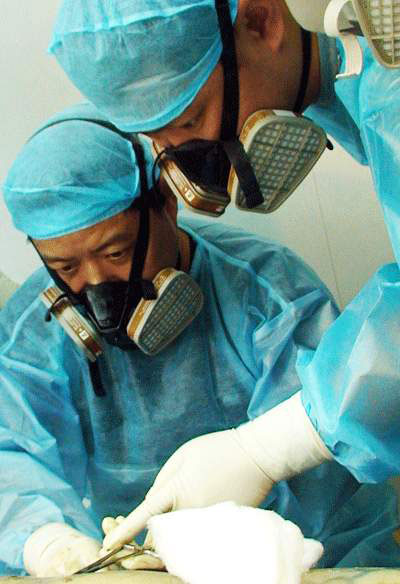

"There is space for a lot of improvement, on the control of narrative rhythm and his exploring of human nature," says Zhu Lili, professor at the School of Journalism and Communication at Nanjing University, Jiangsu province.
"But writing from within the trade represents a segmentation of the cultural industry. I am optimistic about this phenomenon."
 |
|
Qin Ming and his colleague work in the morgue doing autopsies. Photos provided to China Daily |
Qin's idea for the novel started in February, when he was inspired by a Web celebrity Yu Ying, an attending doctor at the Peking Union Medical College Hospital, who posted her anecdotes at work on Sina Weibo.
"Her weibo posts promote better understanding between doctors and the public," says Qin. "I can write a novel about the daily life of forensics, making this occupation more visible to the society."
After his Spring Festival vacation, Qin plunged into writing with zeal. Every day after work, he would start writing after 9 pm, finishing about 6,000 characters per day and updating 4,000 characters of content on his blog.
"I was surprised to find so many people liking my stories," says Qin. "By the beginning of April, I had already received more than 20 book offers from publishers."
Writing, however, was not an easy part-time job. The former science student encountered enormous challenges in writing, from using the correct words to story structuring and setting the scene for suspense.
His onerous schedule at work often gnawed away his writing time, and all those late nights writing gave him a corneal ulcer.
But every time Qin wanted to give up, he would quote Stephen King, who defines writing as this: "In the end, it's about enriching the lives of those who will read your work, and enriching your own life, as well you can, you should, and if you're brave enough to start, you will."















